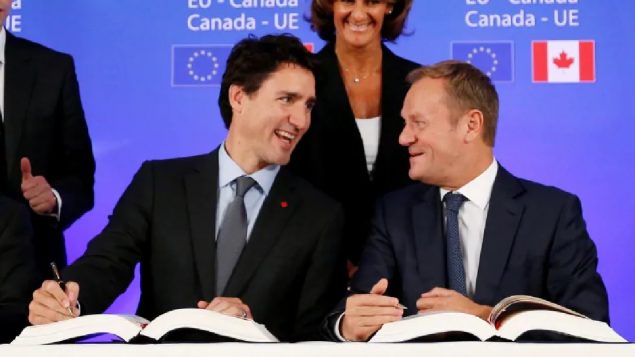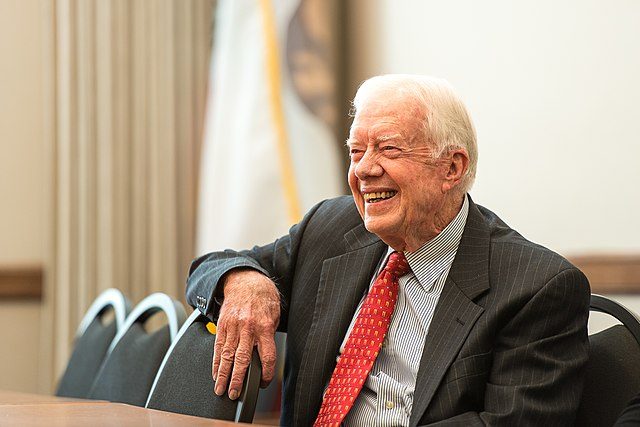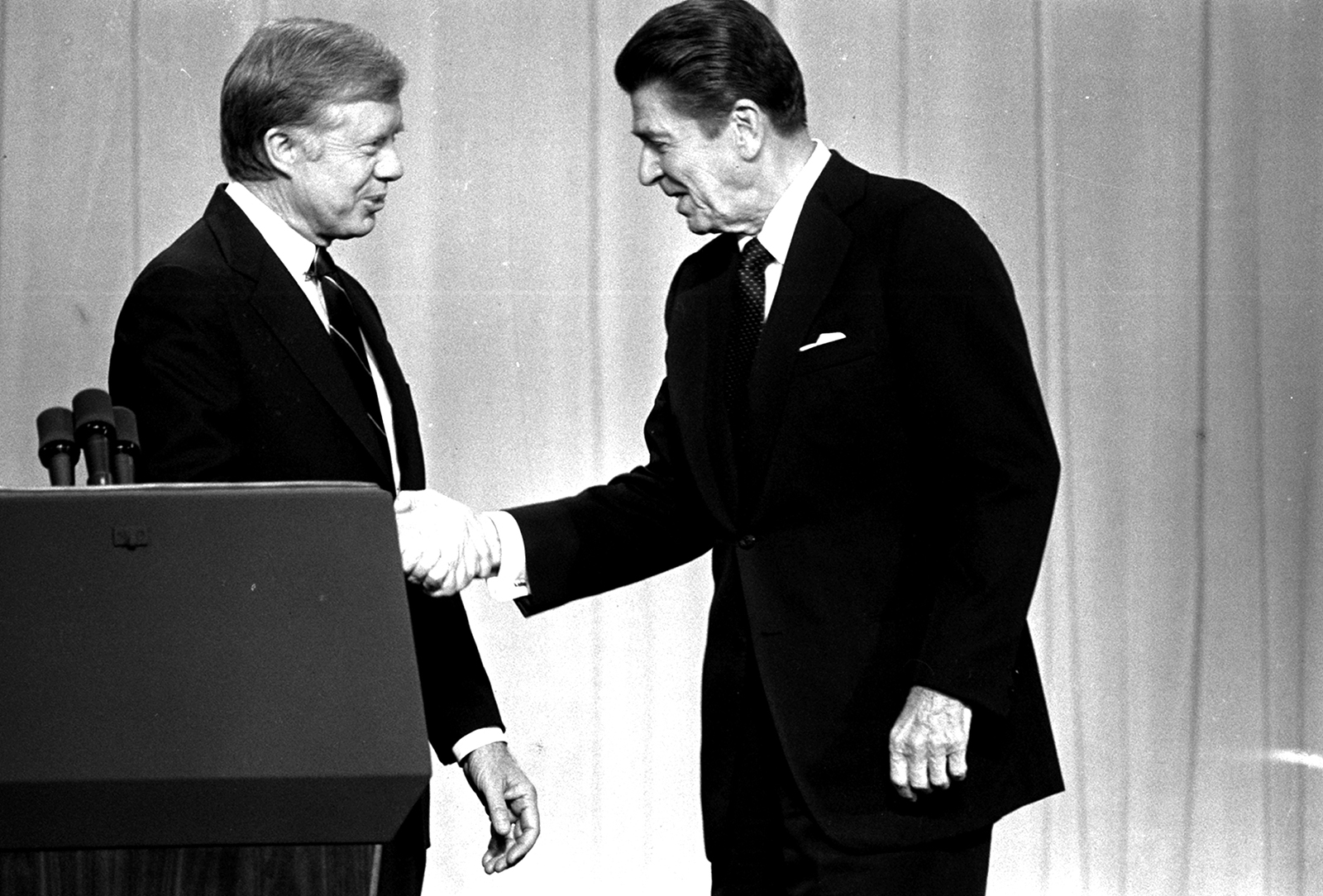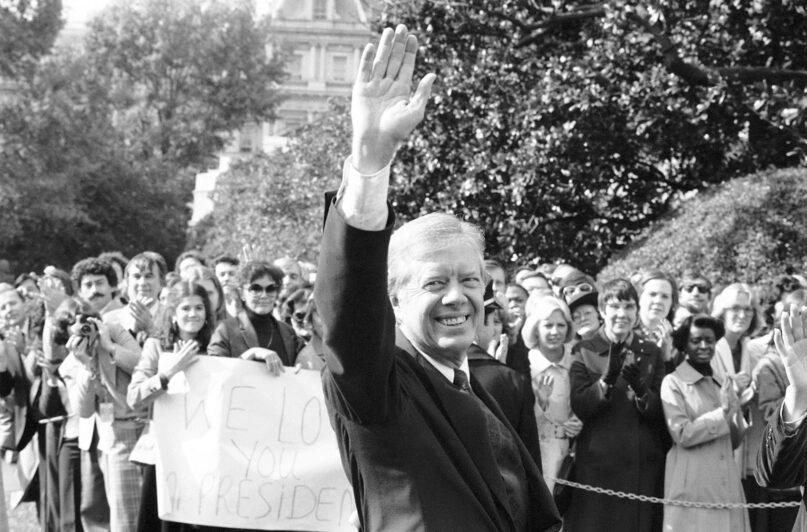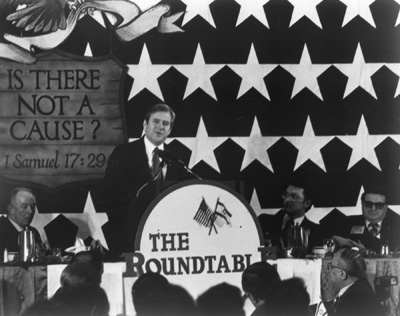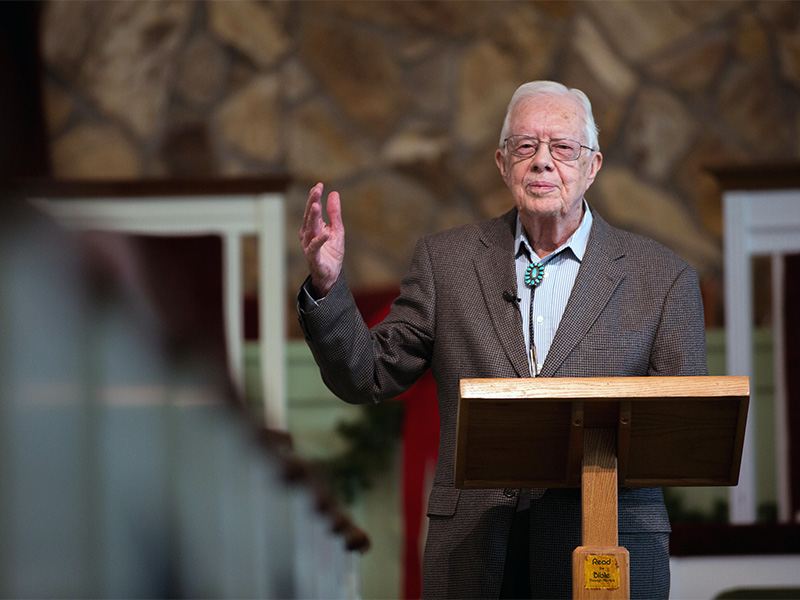Farmers fume over CETA failings
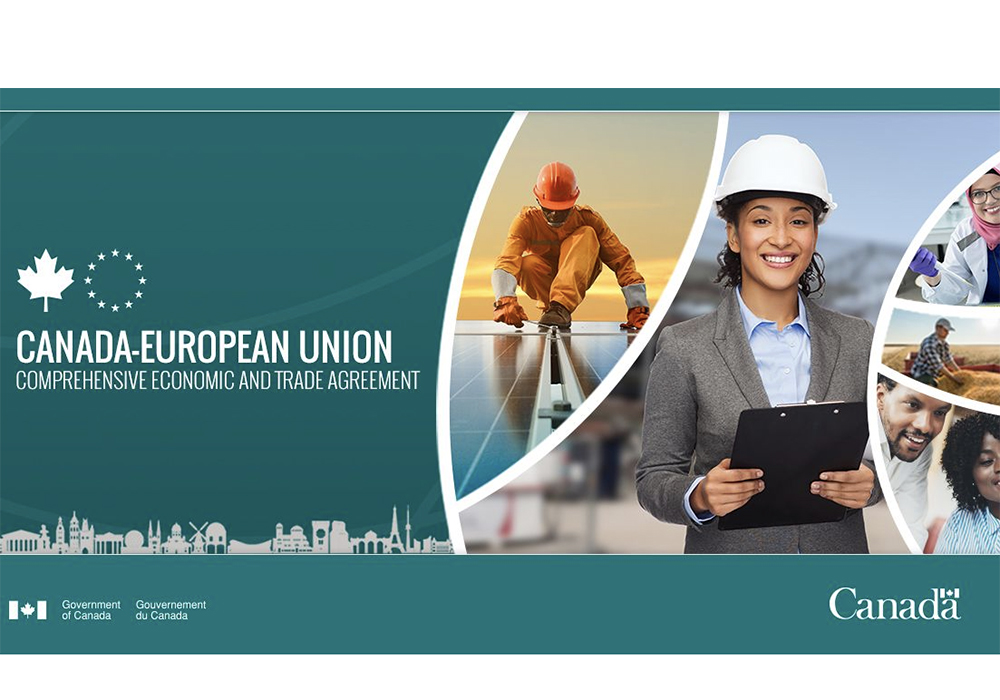
Exporters say a combination of unreasonable EU regulations, obstruction by EU officials and rogue behaviour by EU member states such as Italy have stopped expected gains for Canadian farmers.
Agricultural exporters are fuming over the failings of the Canada-European Union trade deal, which has achieved virtually little for Canadian farmers.
Yet EU ag exporters have seen their food sales to Canada soar, unaffected by the vexatious measures Canadian exporters believe the EU imposes to prevent reciprocal access. The situation has a wide swath of trade interests demanding the federal government act.
“Something more has to be done. Their efforts to date have not been sufficient, clearly,” said Erin Gowriluk, the executive director of the Grain Growers of Canada, which represents most of Canada’s farmers of free market crops and livestock.
“Canada is going to have to begin to assert itself in the global marketplace. It’s going to have to do that through example.”
The third anniversary of the signing of the CETA (the Canada-EU deal born in 2017) brought positive and celebratory statements from both European and Canadian government officials, but agricultural exporters and those championing their cause saw the anniversary as a key moment to denounce the reality of the deal.
In the past three years every significant agricultural export from Canada — pork, beef, grains, oilseeds — has faced continued non-tariff barriers, and some have even been increased.
“It’s been three years. It’s been long enough,” said an exasperated Claire Citeau, the executive director of the Canadian Agri-Food Trade Alliance, which brings together most of Canada’s agriculture and food exporters, including the GGC.
“It’s time to now really do something about it because it’s an agreement that continues to hold so much promise for Canadian agri-food exporters, yet continues to fall short.”
Exporters say a combination of unreasonable EU regulations, obstruction by EU officials and rogue behaviour by EU member states such as Italy have stopped expected gains for Canadian farmers.
While there is annoyance with the EU over the perception of bad-faith trade relations with Canada from the exporters, their bone to pick today is with the federal government’s seeming disengagement from the situation.
“It lacks a sense of urgency,” said Gowriluk.
“This needs to be seen as an urgent issue that needs to be resolved.”
The exporters received a high-level vote of support from a non-partisan group of five premiers, who issued a strongly worded letter to federal ministers involved with trade and agriculture, and to the prime minister himself.
“We have held up our part of the bargain. The EU must do the same and be held accountable to its trade commitments,” says the letter, signed by former conservative premiers Jean Charest, Brad Wall and Ed Stelmach, former Liberal premier Kathleen Wynne and former NDP premier Gary Doer.
“We believe you should raise these issues directly with EU leaders including the leaders of relevant EU member states…. Now more than ever, the EU needs to show its relevance in the global economy by championing the core issues that will help ensure the global economy recovers from one of the gravest economic threats the world has ever known.
“If the EU cannot implement and enforce agreements it has negotiated, its authority and credibility as a negotiating partner will be severely undermined. This is also true for Canada.”
Canada’s premiers were important players in the discussions leading up to the CETA. Charest, in particular, has played a key role in broadening trade ties between Canada and many places, including Europe and the eastern U.S. states below his home province of Quebec.
There is little proof that the EU is deliberately frustrating attempts of Canadian agricultural goods.
Yet in commodity after commodity, export hopes have been frustrated by various challenges.
Canola producers have been faced with nebulous “sustainability” standards that have practically stymied most food grade exports.
Beef and pork exports, expected to make major gains once CETA was approved, have stagnated, wrestling with an array of EU regulations that affect both on-farm production and slaughter plant operations in Canada.
Canadian crops face numerous challenges with almost-impossible-to-meet tolerances on some pesticides and other products, so that most trade is strangled.
Subsidized EU sugar makes Canadian foods including non-subsidized sugar prohibitively expensive.
And Italy has imposed country-of-origin labelling on Canadian durum, in defiance of the EU’s own laws, strangling access to its markets.
While each situation is unique, when put together they create among the exporters a perception that the EU has a goal of restricting market access in contravention of the CETA.
“The problem is not with the CETA itself but (with) the European Union’s refusal to solve the issues that will enable our trade and more trade for Canadian agri-food exporters,” said Citeau.
“The content (of CETA) is good… but today the EU is not abiding by commitments to remove technical barriers.”
The exporters said they were impressed by the Trudeau government’s resolute action in renegotiating a new NAFTA deal and sticking up for Canada’s exporters, despite heated words and actions from the U.S. administration. That’s the sort of approach it is demanding Canada take with the EU.
The premiers’ letter also praises the work done in renewing NAFTA, and calls upon the government to ensure CETA is respected, or risk jeopardizing Canada’s ability to trade even withnations with which it has deals. They want the issue raised at a high-profile gathering: the next G7 summit.
“The past few years have shown us just how harmful it is when trade agreements and rules are ignored or disavowed,” they said.
“We urge you to continue to stand up for Canada’s agri-food exporters by making sure these issues are at the top of the agenda when you meet with your EU counterparts and with the leaders of EU member states."
Federal government stays positive about EU trade
By Ed White
Published: October 1, 2020

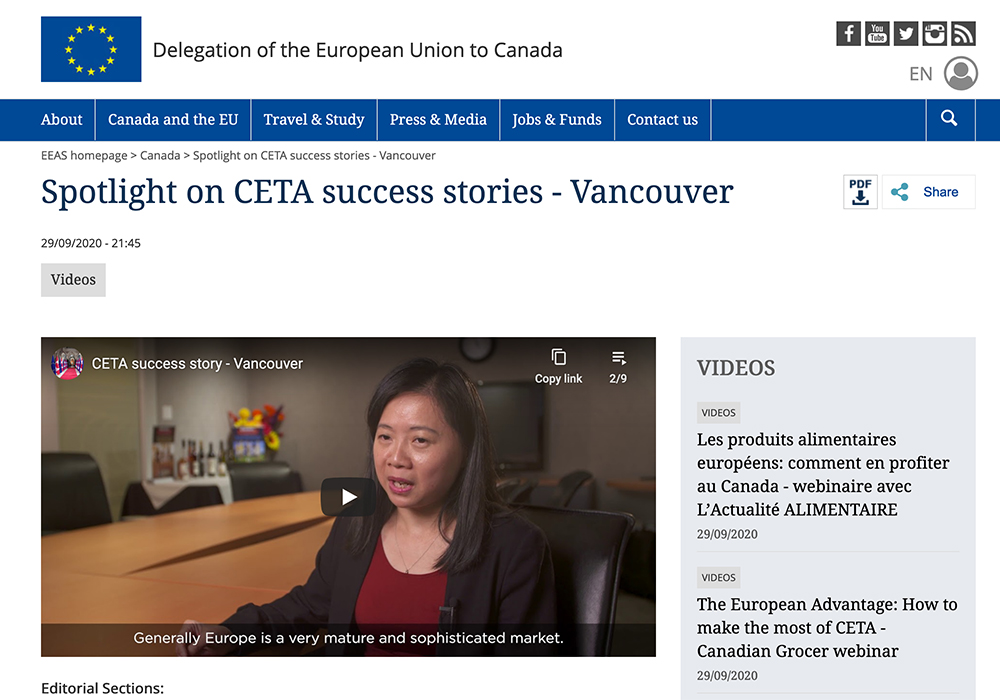
On the EU Delegation to Canada’s website are stories and videos such as “Spotlight on CETA success stories – Vancouver.” | Screencap via eeas.europa.eu
Canada’s government leaders are maintaining a cautiously optimistic tone in describing the Canada-European Union trade deal, despite frustrations from vexed Canadian exporters.
But while remaining positive and constructive in tone, federal cabinet ministers have repeatedly encouraged European leaders and officials to fix the chronic problems that have stymied Canadian hopes for improved agricultural trade.
“CETA (Comprehensive and Economic Trade Agreement) marked a new chapter in the relationship between the European Union and Canada and is delivering unparalleled opportunities for Canadians and our businesses,” said Ryan Nearing, the press secretary to International Trade Minister Mary Ng, on Sept. 25, a few days after the third anniversary of the deal.
The frustrations of agri-food exporters are well known and “our government is actively working to resolve challenges such as the non-tariff barriers posed by EU regulations in agriculture and food. Minister Ng has raised this issue with her EU counterparts numerous times, including in many discussions with former EU Trade Commissioner Phil Hogan.”
The problems have also been regularly acknowledged by federal Agriculture Minister Marie-Claude Bibeau, as recently as a Sept. 25 appearance at an online agriculture summit.
Canadian farmers should be benefitting from CETA, “which is not the case yet.”
The CETA was a hallmark achievement of both the Stephen Harper Conservative government, which negotiated the deal, and the Justin Trudeau Liberal government, which saw it finalized, approved in Canada and shepherded through the EU’s byzantine political, bureaucratic and national governments system.
One of the chief gains hoped for was increased exports of pork and beef, as well as better protection for crops and foods that had regularly faced political challenges. The CETA created resolution systems designed to keep politics out of regulatory issue.
However, Canada’s agri-food exports to the EU have stagnated since the agreement came into force. EU exports to Canada, however, have surged.
Exporters have not accused the government of ignoring the issue, since it has been often raised.
Indeed, on May 15 Global Affairs Canada issued a news release detailing Ng’s meeting with the EU’s Hogan in which it explicitly referred to Canadian frustrations.
“Minister Ng impressed the need for Canada and the EU to work together to ensure Canadian businesses and workers, specifically our farmers, producers and manufacturers, benefit from the agreement,” reads the release.
“She underscored the importance of improving EU market access for Canadian agricultural products through the removal of technical barriers to trade. She also emphasized the need to accelerate the accreditation of Canadian conformity assessment bodies responsible for the certification of Canadian goods to EU requirements.”
The EU faced a number of challenges from groups within member states when CETA was negotiated, and the approval process was tortuous.
Since it has come into force, the EU has pointed to the deal as evidence of its desire to be a global free-trader.
It has also, similar to the Canadian government, celebrated the deal’s successes.
On the EU Delegation to Canada’s website are stories and videos such as “Spotlight on CETA success stories – Vancouver.”
That positive tone is typical in its approach.
Canada and the EU work closely on numerous issues of international trade, including trying to protect and bolster the World Trade Organization and the rules-based trading order.
Canada’s agri-food exporters and a group of former premiers believe the federal government needs to make a bigger issue out of the current challenges because the situation is not an improvement on the pre-CETA situation. They have suggested an upcoming G7 meeting at which this could be discussed.
